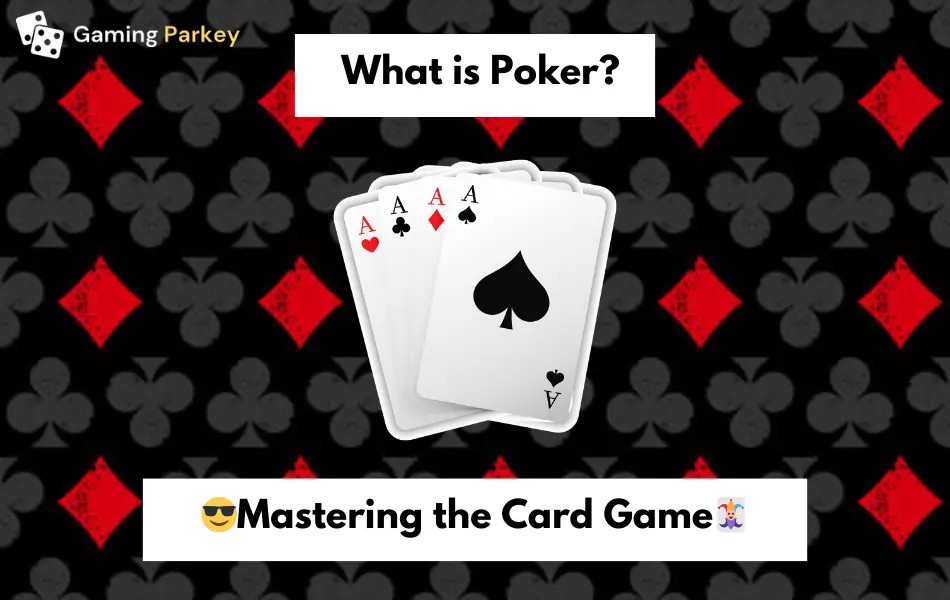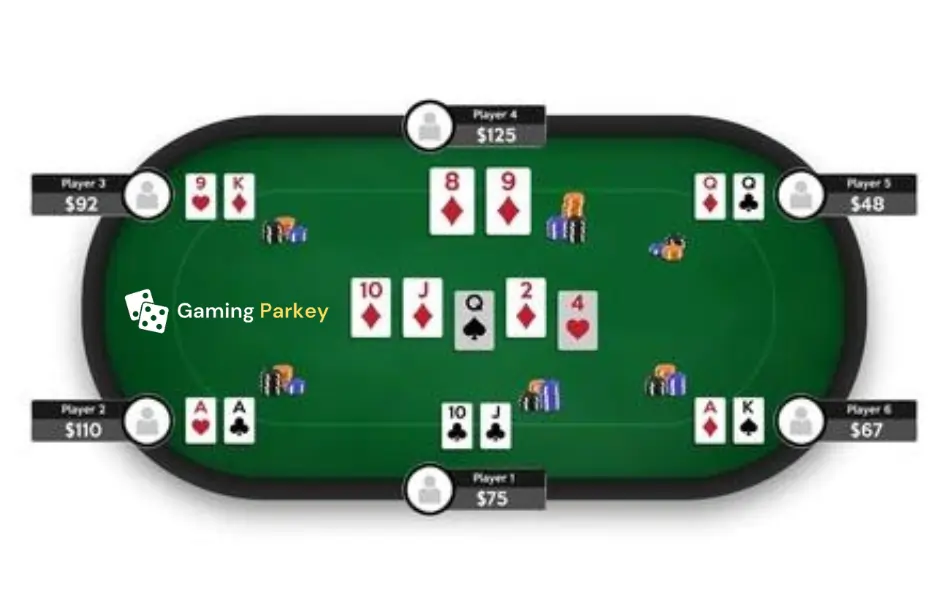Whether you're a professional player or new to the world of card games, poker is a name that is likely to ring a bell. Poker is a popular and widely played game that combines skill, strategy, and a dash of luck.
In this article, we'll explore what poker is all about, get into its intriguing history, and touch upon some of the popular variations of the game.
So, buckle up as we explore around this game loved by many!!
What is Poker?

At its core, poker is a competitive card game that involves multiple players. The objective of the game is to win bets by forming the highest-ranking hand or by making opponents fold their hands. Poker is played using a standard deck of 52 cards, and the rules can vary depending on the variant being played.
Poker has gained immense popularity for its strategic elements, as players must analyze their hands, assess the strength of their opponents' hands, and make calculated decisions based on their observations. If you're interested in learning how to play poker, check out our article on how to play poker? for a detailed guide.
Brief History of Poker
The exact origins of poker are shrouded in mystery, but the game has a rich and fascinating history. The roots of poker can be traced back to various card games that were played in different regions across the globe. The game evolved over time and gained popularity in the United States during the 19th century.
It is believed that poker was inspired by several card games, including the French game Poque, the Persian game As Nas, and the German game Pochen. These games contributed to the development of different aspects of poker, such as the betting and bluffing components.
As the popularity of poker grew, it underwent numerous transformations and gave rise to various popular variations that are still played today. Some of the most well-known variations include Texas Hold'em, Omaha, Seven-Card Stud, and Five-Card Draw. Each variant has its own unique set of rules and gameplay. If you're interested in learning more about a specific variation, check out our article on how to play Texas Hold'em.
Popular Variations of Poker
Poker enthusiasts have a wide range of variations to choose from, each with its own set of rules and strategies. Let's take a brief look at some of the popular variations of poker:
| Variation | Description |
|---|---|
| Texas Hold'em | The most widely played poker variant, where players are dealt two private cards and must make the best hand possible using community cards. |
| Omaha | Similar to Texas Hold'em, but players are dealt four private cards and must use exactly two of them to form their hand. |
| Seven-Card Stud | In this variant, players receive a combination of face-up and face-down cards, and must form the best hand using their own cards and the community cards. |
| Five-Card Draw | A classic variant where players are dealt five private cards and have the option to exchange or trade cards to improve their hand. |
| Caribbean Stud Poker | A casino variant where players compete against the dealer rather than each other, with the goal of achieving a better hand. |
Each variation offers its own unique gameplay and strategic elements, making poker an exciting and ever-evolving game. By exploring the different variations, players can find the one that suits their preferences and enjoy the thrill of the game.
As we dive deeper into the world of poker, we'll uncover the basics, explore advanced strategies, and discuss the fascinating gameplay in more detail. So, grab your deck of cards and get ready to master the art of poker!
Understanding the Basics of Poker
To dive into the world of poker, it's crucial to grasp the basic elements that form the foundation of this popular card game. This section will cover the deck of cards, hand rankings, and the objective of the game.
The Deck of Cards
Poker is played with a standard deck of 52 cards. The deck consists of four suits: hearts, diamonds, clubs, and spades. Each suit contains thirteen cards, including an ace, numbered cards 2 through 10, and face cards — jack, queen, and king. In some variations, a joker may also be included.
Hand Rankings
Hand rankings are essential to determine the strength of your cards in poker. The following table showcases the different poker hand rankings in descending order:
| Hand | Description |
|---|---|
| Royal Flush | A, K, Q, J, 10 of the same suit |
| Straight Flush | Five consecutive cards of the same suit |
| Four of a Kind | Four cards of the same rank |
| Full House | Three of a kind plus a pair |
| Flush | Five cards of the same suit |
| Straight | Five consecutive cards of any suit |
| Three of a Kind | Three cards of the same rank |
| Two Pair | Two sets of pairs |
| One Pair | Two cards of the same rank |
| High Card | The highest-ranking card in your hand |
Understanding these hand rankings is crucial to determining the value of your cards during gameplay. The goal is to form the highest-ranking hand possible, which will lead us to the objective of the game.
The Objective of the Game
The objective of poker is to win chips or money by having the best hand or by convincing other players to fold. Players place bets based on the perceived value of their hand and the potential of winning the pot. The pot consists of all the bets made by the players in a particular hand.
By combining the cards in their hand with the community cards (cards that are shared among all players), players aim to create the highest-ranking hand. The player with the strongest hand at the end of the game or the player who successfully convinces others to fold wins the pot.
Now that we have a solid understanding of the basic elements of poker, we can delve into the gameplay itself, exploring the setup, betting rounds, and showdown. Stay tuned to learn more about the strategies and techniques that can help you master this intriguing card game.
Poker Gameplay
Once you understand the basics of poker, it's time to dive into the gameplay itself. This section will cover the setup, betting rounds, and showdown.

The Setup
Before the game begins, the dealer is determined. In casino settings or online platforms, this is typically done automatically. The dealer is responsible for distributing the cards and managing the betting rounds. In home games, players can take turns being the dealer.
Next, the deck of cards is shuffled thoroughly to ensure randomness. A standard deck of 52 cards is used in most variations of poker. Once shuffled, the dealer distributes a specific number of cards to each player, depending on the variation being played.
The Betting Rounds
Once the cards are dealt, the betting rounds begin. The betting rounds are a crucial part of poker and involve players placing bets based on the strength of their hands or their ability to bluff their opponents.
The first betting round is called the pre-flop. In this round, players evaluate their initial hand and decide whether to stay in the game by matching the current bet, raise the bet, or fold their hand and exit the game. The pre-flop continues until all players have either called or folded.
After the pre-flop, the flop follows. In this round, the dealer reveals three community cards that are placed face-up on the table. The players then have another opportunity to bet or fold based on their hand's strength and the potential combinations with the community cards.
The turn is the next betting round. Here, the dealer reveals a fourth community card, adding to the options available for creating winning hands. Players make their betting decisions based on the new information.
Finally, the river is the last betting round. In this round, the dealer reveals the fifth and final community card. Players have one last chance to bet or fold before the game proceeds to the showdown.
The Showdown
If there are still two or more players remaining after the betting rounds, the game proceeds to the showdown. In this final stage, the remaining players reveal their hands, and the player with the highest-ranking hand wins the pot.
It's important to note that in some cases, players may not reach the showdown. If a player makes a bet that no other player is willing to match, that player wins the pot without revealing their hand.
Understanding the gameplay of poker is crucial for success in the game. By familiarizing yourself with the setup, the betting rounds, and the showdown, you'll be better equipped to make strategic decisions and outplay your opponents. For more information on how to play specific poker variations, check out our articles on how to play poker and how to play Texas Hold'em. Remember, poker is not solely about the cards you hold but also about the skills and strategies you employ to outwit your opponents.
Strategies and Techniques of Poker
To truly master the game of poker, players must become adept at employing various strategies and techniques. These skills can make a significant difference in their overall success at the table. In this section, we will explore three important aspects of poker strategy: reading your opponents, bluffing and deception, and bankroll management.
Reading Your Opponents
One of the key skills in poker is the ability to read your opponents. Reading your opponents involves observing their behavior, body language, and betting patterns to gain insights into the strength of their hand. By paying close attention to these cues, experienced players can make more informed decisions during the game.
Some common tells to look out for when reading your opponents include:
- Betting Patterns: Take note of how your opponents bet in different situations. Do they tend to bet aggressively with strong hands or cautiously with weaker ones?
- Body Language: Watch for any physical cues that may indicate the strength or weakness of a player's hand. For example, nervousness or hesitation could suggest a weaker hand, while confidence and ease may indicate a strong hand.
- Timing: Pay attention to the amount of time your opponents take to make their decisions. Quick decisions may indicate a strong hand, while longer pauses could suggest uncertainty or weakness.
By honing your ability to read your opponents, you can gain valuable information that can influence your own decisions and give you an edge at the table. For a more detailed guide on how to read your opponents, check out our article on action in poker.
Bluffing and Deception
Bluffing is a fundamental aspect of poker that involves betting or raising with a weak hand to deceive your opponents into thinking you have a stronger hand. However, successful bluffing requires careful consideration and timing. Bluffing and deception can be powerful tools in your poker arsenal when used strategically.
When bluffing, it's important to consider the following:
- Table Image: Your table image refers to the perception your opponents have of your playing style. If you have a tight and conservative image, bluffing may be more effective, as your opponents are more likely to believe you have a strong hand.
- Position: Bluffing is generally more effective when you are in a later position, as you have more information about your opponents' actions. This allows you to assess the likelihood of their hands being strong or weak.
- Board Texture: The cards on the board can greatly impact the success of a bluff. Bluffing on a coordinated board with many potential strong hands is riskier than bluffing on a less threatening board.
Remember, bluffing should be used sparingly and selectively. Overusing this strategy can lead to predictability and make your opponents more likely to call your bluffs. For a comprehensive guide on how to effectively bluff in poker, check out our article on how to play poker?.
Bankroll Management
Bankroll management is a crucial aspect of poker strategy that often gets overlooked. Proper bankroll management involves setting limits on the amount of money you are willing to risk and allocating your funds wisely. By managing your bankroll effectively, you can minimize the risk of going broke and ensure longevity in the game.
Here are some key tips for bankroll management:
- Set a Budget: Determine the maximum amount of money you are comfortable losing. This will help you set limits and avoid chasing losses.
- Manage Your Bets: Only bet a small percentage of your total bankroll on each hand. This helps protect your funds and prevents excessive losses.
- Track Your Results: Keep a record of your wins and losses to analyze your performance over time. This will give you insights into your profitability and help you make informed decisions.
By implementing sound bankroll management strategies, you can mitigate the risks associated with playing poker and increase your chances of long-term success. For more detailed guidance on bankroll management, check out our article on how to play texas holdem.
Mastering the strategies and techniques of poker takes time, practice, and experience. By developing your skills in reading opponents, bluffing and deception, and bankroll management, you can elevate your game and increase your chances of achieving success at the poker table.
Online Poker
The world of online poker has opened up a whole new realm of possibilities for poker enthusiasts. With the advent of technology, players can now enjoy their favorite card game from the comfort of their own homes. In this section, we will explore the advantages of online poker, provide tips for playing online, and discuss responsible gambling practices.
Advantages of Online Poker
Online poker offers several advantages that make it an attractive option for both experienced players and newcomers to the game. Here are some key benefits of playing poker online:
- Convenience: One of the biggest advantages of online poker is the convenience it offers. Players can access their favorite poker games at any time, from anywhere, as long as they have an internet connection. This eliminates the need to travel to a physical casino, saving time and money.
- Game Variety: Online poker platforms provide a wide range of game variations and formats. Whether you prefer Texas Hold'em, Omaha, or Stud, you can easily find a game that suits your preferences. Additionally, online poker sites often host tournaments with varying buy-ins and prize pools, offering players exciting opportunities to test their skills and compete against others.
- Lower Stakes: Online poker allows players to participate in games with lower stakes compared to traditional brick-and-mortar casinos. This makes it more accessible for players with smaller bankrolls or those who want to practice their skills without risking significant amounts of money.
- Player Volume: Online poker platforms attract a large number of players from around the world. This creates a vibrant and active player pool, ensuring that there are always opponents available at various skill levels. Whether you're a beginner or an experienced player, you can find suitable competition online.
Tips for Playing Online Poker
While online poker offers many advantages, it's important to approach the game with the right strategy and mindset. Here are some tips to enhance your online poker experience:
- Choose a Reputable Site: Selecting a reliable and trustworthy online poker site is crucial to ensure a fair and secure gaming environment. Look for sites that are licensed and regulated by reputable authorities to guarantee the safety of your funds and personal information.
- Start with Low Stakes: If you're new to online poker, it's advisable to start with low-stakes games. This allows you to familiarize yourself with the online platform, gain experience, and build confidence without risking significant amounts of money.
- Practice Bankroll Management: Proper bankroll management is essential in online poker. Set a budget for your poker activities and stick to it. Avoid chasing losses and never gamble with money you can't afford to lose. For more information on bankroll management, check out our article on action in poker.
- Learn Online Poker Etiquette: Familiarize yourself with the rules and etiquette specific to online poker. Be respectful to other players, avoid disruptive behavior, and follow the site's guidelines and policies.
Responsible Gambling Practices

While online poker can be an enjoyable and potentially profitable activity, it's important to practice responsible gambling. Here are some guidelines to ensure a safe and responsible online poker experience:
- Set Limits: Determine your limits in terms of time and money before you start playing. Stick to these limits and avoid getting carried away in the heat of the game.
- Take Breaks: It's important to take regular breaks during your online poker sessions. This helps you maintain focus and prevent gambling fatigue.
- Recognize Signs of Problem Gambling: Be aware of the signs of problem gambling, such as gambling for extended periods, neglecting other responsibilities, or chasing losses. If you suspect you or someone you know may have a gambling problem, seek help from support organizations.
Remember, online poker should be seen as a form of entertainment, and it's important to approach it responsibly. By following these tips and practicing good bankroll management, you can enjoy the excitement of online poker while keeping your gambling experience enjoyable.

![How to Play Mini Baccarat? From Novice to Pro [2025 Guide]](https://gamingparkey.com/wp-content/uploads/2023/09/Discover-How-to-Play-Mini-Baccarat--450x338.webp)












